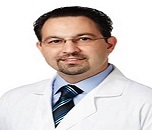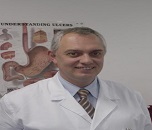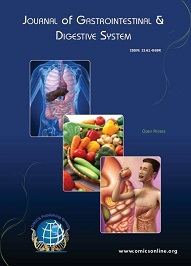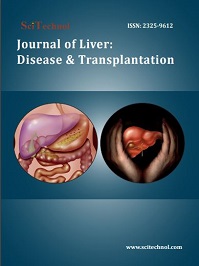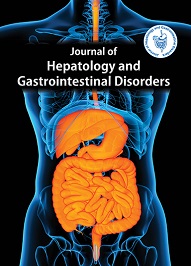Theme: Executing Advanced therapies in treating Digestive and Liver Diseases
Euro Gastro-2020
- Welcome Message
- About Conference
- Abstract Submission & Important Dates
- Sessions/Tracks
- Market Analysis
- Participation Options
Welcome to the official website of the 2020 22nd International Conference on Gastroenterology and Hepatology. Euro Gastro 2020 will be held during October 21-22, 2020, over the theme “Executing Advanced therapies in treating Digestive and Liver Diseases”.
We are sincerely inviting all Medical & Clinical Experts who are keen on sharing their research experience and practical knowledge in the arena of Gastroenterology and Hepatology. This is an astounding opportunity for the representatives from Universities and Institutes to connect with the world class Scientists and Speakers at our Gastroenterology and Hepatology meeting 2020 to discuss new advances in the field of both medical and engineering to improve wellbeing and treatment and furthermore additional innovations. We hope that you will grasp this academic event to revive the enduring associations and glimmer with new companions the world over.
22nd International Conference on Gastroenterology and Hepatology is organizing an outstanding Scientific Exhibition/Program and anticipates the world's leading specialists involved in Gastroenterology and Hepatology Research. We welcome all of you across the world to attend the International Conference on Gastroenterology and Hepatology which will be held on October 21-22, 2020 which includes brief keynote introductions, Poster presentations, Oral talks and Exhibitions. Your organization will profit with phenomenal exposure to the pioneers in Gastroenterology and Hepatology. You can update your knowledge about the current situation of Digestive and Liver diseases and receive name recognition at this 2-days event. Gastro events are an energizing chance to exhibit new innovation. Incredibly famous speakers, the latest methods, strategies, and the latest updates in gastro liver research fields are hallmarks of this conference.
The Euro Gastro 2020 conference participants include pioneers in the field, as well as emerging scholars, who travel to the conference from all edges of the globe and speak to an expansive scope of orders and viewpoints. An assortment of introduction alternatives and session types offer opportunities for attendees to share their work, talk about key issues in the field, and build relationships with attendees. Digital and social media give the ideal stage and exposure that the most recent scientific advancements in the field of treating digestive and liver diseases, spreading the information from one corner to the next everywhere throughout the world, connecting each little or huge group of spectators, allowing to collaborate and giving scope for utilizations of these developments in improving worldwide health.
Salient Features:
- Well-structured workshops, events and symposia
- Renowned speakers and scientists across the globe
- Poster presentations and world class exhibits
- Panel discussions & interactive sessions
- Perfect platform for global networking
- B2B meetings
- Alliances and associations
- Collaborative Research opportunities
Target Audience:
- Gastroenterologists
- Hepatologists
- Surgeons
- Internal Medicine Physicians
- Oncologists
- Scientists
- Researchers and Scholars
- Physician’s Assistant and Nurses
- Academicians
- Delegates
- Business entrepreneurs
- Pharmaceutical companies
- Companies manufacturing medical devices
- Healthcare Institutions
- Research and Medical Laboratories
Abstract Submission Guidelines:
- The length of the abstract should not more than 300 words.
- The title of the conference must be in Sentence case.
- There should be name of the author and co-authors (if any).
- Your full name, affiliation (degree, institution/ company/ University name, address, contact number and email address) must be mentioned here.
- Short biography of the author must not exceed from 100 words.
- They must be submitted before the deadlines.
- All the abstracts will be reviewed by the committee and you will get a email within 24-48 hours after submission of your abstract.
- All the accepted abstracts will be published in the conference proceeding books.
Abstract Submission Link: https://gastroenterology.insightconferences.com/abstract-submission.php
The Young Researchers Forum offers young researchers the possibility to meet and discuss research topics and methodologies, share and develop ideas, learn from each other and gain knowledge from senior researchers.
Young Researcher Sessions are organized at the 22nd International Conference on Gastroenterology and Hepatology to provide a unique platform for Young Researches/Investigators for presenting the latest research projects with an in-depth analysis. Euro Gastro 2020 cordially invites Young Researchers from Universities/Institutes/Industries to present a short oral presentation during the forum. These oral presentations should be of 10 minutes duration in related scientific track followed by 5 minutes question hour. Therefore, presenters are encouraged to give comprehensive and dynamic talks. Applications will be selected based on past research productivity and future promise.
| Conference dates | October 21-22, 2020 |
| Early Bird Registration | January 31, 2020 |
| Abstract Submission | November 21, 2019 |
Gastroenterology is the study of the normal function and diseases of the throat, stomach, small digestive tract, colon and rectum, pancreas, gallbladder, bile channels and liver. It incorporates a point by point study of the normal action (physiology) of the gastrointestinal organs including the movement of material through the stomach and digestive system (motility), the absorption and retention of supplements into the body, removal of waste from the system, and the capacity of the liver as a digestive organ.
Recommended Conferences: Gastroenterology conferences | Gastroenterology Events | Hepatology Conferences | Hepatology Events | Gastroenterology Symposium | Gastroenterology Conferences in Asia | Hepatology Meetings in Europe | Hepatology Congress | Gastroenterology Workshops | Hepatology symposium | Hepatology Workshops | Gastroenterology Conferences 2020 | Hepatologists Meet | Euro Gastro 2020 | Gastroenterology meetings | Gastroenterology congress | Hepatology meetings | Hepatology congress | Digestive diseases Conferences | Hepatitis Conferences | Gastro Meet in USA | Liver and Hepatitis Conference in Middle East | Hepatology Conferences 2020
Gastrointestinal Bleeding and Pathology
Gastrointestinal bleeding is one of the essential complaints of the patients which could be interminable, mellow or deadly. Most of the conditions, GI bleeding are contained without anyone else's input, yet they are are anyway evaluated to keep up a strategic distance from a repeat and to stay away from advance movement of sickness, expecting any. Gastrointestinal pathology (including liver, gallbladder and pancreas) is a perceived sub-specialty discipline of surgical pathology. Acknowledgment of a sub-specialty is commonly identified with dedicated fellowship training offered within the subspecialty or, on the other hand, to surgical pathologists with an extraordinary intrigue and broad involvement with gastrointestinal pathology. The gastrointestinal (GI) pathology decides quality indicative histopathology on gastrointestinal endoscopic biopsies and resections of the gastrointestinal and pancreatico-biliary systems.
Recommended Conferences: Gastroenterology conferences | Gastroenterology Events | Hepatology Conferences | Hepatology Events | Gastroenterology Symposium | Gastroenterology Conferences in Asia | Hepatology Meetings in Europe | Hepatology Congress | Gastroenterology Workshops | Hepatology symposium | Hepatology Workshops | Gastroenterology Conferences 2020 | Hepatologists Meet | Euro Gastro 2020 | Gastroenterology meetings | Gastroenterology congress | Hepatology meetings | Hepatology congress | Digestive diseases Conferences | Hepatitis Conferences | Gastro Meet in USA | Liver and Hepatitis Conference in Middle East | Hepatology Conferences 2020
Colorectal and Intestinal Disorders
Gastrointestinal maladies allude to sicknesses including the gastrointestinal tract, to be specific the throat, stomach, small digestive tract, internal organ and rectum, and the adornment organs of ingestion, the liver, gallbladder, and pancreas. Gastrointestinal issue incorporates such conditions as obstructing, irritable inside clutter, hemorrhoids, butt-centric gaps, perianal abscesses, butt-centric fistulas, perianal contaminations, diverticular sicknesses, colitis, colon polyps and infection. Enormous quantities of these can be envisioned or constrained by keeping up a sound lifestyle, practicing extraordinary entrail inclinations, and submitting to tumor screening.
Recommended Conferences: Gastroenterology conferences | Gastroenterology Events | Hepatology Conferences | Hepatology Events | Gastroenterology Symposium | Gastroenterology Conferences in Asia | Hepatology Meetings in Europe | Hepatology Congress | Gastroenterology Workshops | Hepatology symposium | Hepatology Workshops | Gastroenterology Conferences 2020 | Hepatologists Meet | Euro Gastro 2020 | Gastroenterology meetings | Gastroenterology congress | Hepatology meetings | Hepatology congress | Digestive diseases Conferences | Hepatitis Conferences | Gastro Meet in USA | Liver and Hepatitis Conference in Middle East | Hepatology Conferences 2020
Advances in Gastrointestinal Endoscopy
Gastrointestinal endoscopy is a technique that enables your specialist to look at inside covering of your throat your stomach, and the underlying section of your small digestive tract. A thin, adaptable review apparatus called an endoscope (scope) is utilized. High-definition and magnification endoscopes with electronic chromo endoscopy capability make it simpler to envision unobtrusive injuries, for example, small and flat polyps and patches of dysplastic gastrointestinal mucosa. They permit exact portrayal of polyps, which may later on enable us to specifically resect just precancerous colonic polyps, while ignoring small considerate hyperplastic polyps, which in turn will result in significant healthcare savings. New advanced choledochoscopes have tremendously improved symptomatic and remedial capacities inside the bile and pancreatic duct. Confocal endomicroscopy now enables us to perform microscopic evaluation of living tissues, improving focused biopsies in Barrett's oesophagus and supporting in the assessment of bile duct strictures and pancreatic cysts. Similarly, technological advances in endoscopic ultrasound, optical coherence tomography and spectroscopy hold great promise for improving indicative and remedial abilities for gastrointestinal illness.
Recommended Conferences: Gastroenterology conferences | Gastroenterology Events | Hepatology Conferences | Hepatology Events | Gastroenterology Symposium | Gastroenterology Conferences in Asia | Hepatology Meetings in Europe | Hepatology Congress | Gastroenterology Workshops | Hepatology symposium | Hepatology Workshops | Gastroenterology Conferences 2020 | Hepatologists Meet | Euro Gastro 2020 | Gastroenterology meetings | Gastroenterology congress | Hepatology meetings | Hepatology congress | Digestive diseases Conferences | Hepatitis Conferences | Gastro Meet in USA | Liver and Hepatitis Conference in Middle East | Hepatology Conferences 2020
The esophagus is the solid cylinder that conveys nourishment and fluids from your mouth to the stomach. You may not be aware of your esophagus until you swallow something excessively enormous, excessively hot, or excessively cold. You may likewise see it when something isn't right. You may feel torment or experience difficulty gulping. The most well-known issue with the throat is GERD (gastroesophageal reflux disease). With GERD, a muscle at the end of your esophagus doesn't close appropriately. This permits stomach contents to spill back, or reflux, into the throat and aggravate it. After some time, GERD can make harm the throat. Different issues incorporate acid reflux, malignant growth, and eosinophilic esophagitis. Specialists may utilize different tests to make a diagnosis. These include imaging tests, an upper endoscopy, and a biopsy. Treatment relies upon the issue; a few issues improve with over-the-counter medications or changes in diet. Others may require physician recommended medicines or medical procedure.
Recommended Conferences: Gastroenterology conferences | Gastroenterology Events | Hepatology Conferences | Hepatology Events | Gastroenterology Symposium | Gastroenterology Conferences in Asia | Hepatology Meetings in Europe | Hepatology Congress | Gastroenterology Workshops | Hepatology symposium | Hepatology Workshops | Gastroenterology Conferences 2020 | Hepatologists Meet | Euro Gastro 2020 | Gastroenterology meetings | Gastroenterology congress | Hepatology meetings | Hepatology congress | Digestive diseases Conferences | Hepatitis Conferences | Gastro Meet in USA | Liver and Hepatitis Conference in Middle East | Hepatology Conferences 2020
Gallstones and Bile Duct Stones
Bile duct stones are gallstones in the bile duct. They can begin in the gallbladder and move into the bile duct or they can shape in the bile duct itself. The stones can become lodged in the bile duct, causing a blockage. Gallstones and bile duct stones (also known as choledocholithiasis) are the same, just located in two different areas of the body. Stones may pass immediately out of the bile duct on their own. However, when a stone gets stuck in the bile duct, medicinal intercession is necessary, generally irritation, bacterial infection, and even extreme organ harm can happen.
Recommended Conferences: Gastroenterology conferences | Gastroenterology Events | Hepatology Conferences | Hepatology Events | Gastroenterology Symposium | Gastroenterology Conferences in Asia | Hepatology Meetings in Europe | Hepatology Congress | Gastroenterology Workshops | Hepatology symposium | Hepatology Workshops | Gastroenterology Conferences 2020 | Hepatologists Meet | Euro Gastro 2020 | Gastroenterology meetings | Gastroenterology congress | Hepatology meetings | Hepatology congress | Digestive diseases Conferences | Hepatitis Conferences | Gastro Meet in USA | Liver and Hepatitis Conference in Middle East | Hepatology Conferences 2020
Gastrointestinal Infection and Viral Gastroenteritis
Gastrointestinal infections are viral, bacterial or parasitic infections that cause gastroenteritis, an irritation of the gastrointestinal tract including both the stomach and the small intestine. Symptoms include diarrhoea, vomiting, and abdominal pain. Lack of hydration is the main danger of gastrointestinal infections, so rehydration is significant, yet most gastrointestinal infections are self- constrained and resolve within a couple of days. Viral gastroenteritis is an intestinal infection marked by watery diarrhoea, abdominal cramps, nausea or vomiting, and sometimes fever. The most common way to develop viral gastroenteritis — often called stomach flu — is through contact with an infected individual or by ingesting contaminated food or water. If you're otherwise healthy, you'll likely recover without complications. Yet, for babies, older adults and people with compromised immune systems, viral gastroenteritis can be deadly.
Recommended Conferences: Gastroenterology conferences | Gastroenterology Events | Hepatology Conferences | Hepatology Events | Gastroenterology Symposium | Gastroenterology Conferences in Asia | Hepatology Meetings in Europe | Hepatology Congress | Gastroenterology Workshops | Hepatology symposium | Hepatology Workshops | Gastroenterology Conferences 2020 | Hepatologists Meet | Euro Gastro 2020 | Gastroenterology meetings | Gastroenterology congress | Hepatology meetings | Hepatology congress | Digestive diseases Conferences | Hepatitis Conferences | Gastro Meet in USA | Liver and Hepatitis Conference in Middle East | Hepatology Conferences 2020
Gastroparesis is a medical term for delayed emptying of stomach contents. It occurs from harm to the vagus nerve that reaches out from the brain to the stomach and is generally connected with type 1 and type 2 diabetes. Unregulated high blood sugar (glucose) levels of diabetes harm nerves and veins all through the body, incorporating the vagus nerve in the gastrointestinal tract. Idiopathic gastroparesis is a similar condition in which the exact cause is unknown. It is treated in a similar way as diabetes-related gastroparesis.
Recommended Conferences: Gastroenterology conferences | Gastroenterology Events | Hepatology Conferences | Hepatology Events | Gastroenterology Symposium | Gastroenterology Conferences in Asia | Hepatology Meetings in Europe | Hepatology Congress | Gastroenterology Workshops | Hepatology symposium | Hepatology Workshops | Gastroenterology Conferences 2020 | Hepatologists Meet | Euro Gastro 2020 | Gastroenterology meetings | Gastroenterology congress | Hepatology meetings | Hepatology congress | Digestive diseases Conferences | Hepatitis Conferences | Gastro Meet in USA | Liver and Hepatitis Conference in Middle East | Hepatology Conferences 2020
The gut microbiome is comprised of billions of bacteria and other microorganisms that exist together with other human cells in the lower intestine. Gut microbiota assists with absorption, immune function and brain health. Our gut microbiome starts to develop in very early life, and is affected by genetics, delivery method, age, stress, sickness, environment, drug use, and diet. The ‘balance’ of our gut can be disturbed by a few variables, and this can promote inflammation – a potent risk factor for physical and mental issue.
Recommended Conferences: Gastroenterology conferences | Gastroenterology Events | Hepatology Conferences | Hepatology Events | Gastroenterology Symposium | Gastroenterology Conferences in Asia | Hepatology Meetings in Europe | Hepatology Congress | Gastroenterology Workshops | Hepatology symposium | Hepatology Workshops | Gastroenterology Conferences 2020 | Hepatologists Meet | Euro Gastro 2020 | Gastroenterology meetings | Gastroenterology congress | Hepatology meetings | Hepatology congress | Digestive diseases Conferences | Hepatitis Conferences | Gastro Meet in USA | Liver and Hepatitis Conference in Middle East | Hepatology Conferences 2020
Inflammatory Bowel Disease (IBD) is an idiopathic disease caused by a dysregulated resistant reaction to have intestinal microflora. The two major types of Inflammatory Bowel Disease are ulcerative colitis (UC), which is confined to the colonic mucosa, and Crohn’s diseases (CD), which can impact any system of the gastrointestinal tract from the mouth to the butt, incorporates "skip sores," and is transmural. There is a hereditary inclination for IBD, and patients with this condition are more inclined to the development of malignancy.
Recommended Conferences: Gastroenterology conferences | Gastroenterology Events | Hepatology Conferences | Hepatology Events | Gastroenterology Symposium | Gastroenterology Conferences in Asia | Hepatology Meetings in Europe | Hepatology Congress | Gastroenterology Workshops | Hepatology symposium | Hepatology Workshops | Gastroenterology Conferences 2020 | Hepatologists Meet | Euro Gastro 2020 | Gastroenterology meetings | Gastroenterology congress | Hepatology meetings | Hepatology congress | Digestive diseases Conferences | Hepatitis Conferences | Gastro Meet in USA | Liver and Hepatitis Conference in Middle East | Hepatology Conferences 2020
Therapeutic and Diagnostic Gastroenterology
Therapeutic and Diagnostic Gastroenterology provides a full range of advanced diagnostic and therapeutic endoscopic procedures which includes diagnostic and therapeutic ERCP for pancreatitis pathologies (papillotomy, stone extraction, stricture dilation and stenting, lithotripsy, peroral choledochoscopy and pancreatoscopy), endoscopic ultrasonography which include fine needle aspiration cytology and biopsy and target treatment. Other advanced methods including therapy for Barrett’s esophagus and early cancer including radiofrequency ablation, cyrotherapy and endoscopic mucosal resection. A portion of these diagnostic tools must be sterilized before using since they go about way for infection transmission.
Recommended Conferences: Gastroenterology conferences | Gastroenterology Events | Hepatology Conferences | Hepatology Events | Gastroenterology Symposium | Gastroenterology Conferences in Asia | Hepatology Meetings in Europe | Hepatology Congress | Gastroenterology Workshops | Hepatology symposium | Hepatology Workshops | Gastroenterology Conferences 2020 | Hepatologists Meet | Euro Gastro 2020 | Gastroenterology meetings | Gastroenterology congress | Hepatology meetings | Hepatology congress | Digestive diseases Conferences | Hepatitis Conferences | Gastro Meet in USA | Liver and Hepatitis Conference in Middle East | Hepatology Conferences 2020
Gastrointestinal Radiology and Imaging
Gastrointestinal Radiology or GI Imaging utilizes a state of constant x-beam called fluoroscopy and a barium-based separate texture to make photos of the stomach, throat, digestive tract and other parts of stomach related structure. It is secure, non-invasive, and may be habituated to benefit absolutely destructive reflux, analyze torment, blood in the stool & other side effects. Computed tomography now permits the comprehensive assessment of abdominal and pelvic inflammatory and infectious processes, obstruction, tumor identification and staging, and show of vasculature and obtuse injury impacts. Barium studies of the gastrointestinal tract, enteroclysis for small-bowel assessment, and conventional radiography still have a role, regardless of the broad utilization of fibreoptic endoscopy. Fluoroscopy is as yet significant; however extraordinary advances in innovations have changed gastrointestinal radiology unavoidably.
Recommended Conferences: Gastroenterology conferences | Gastroenterology Events | Hepatology Conferences | Hepatology Events | Gastroenterology Symposium | Gastroenterology Conferences in Asia | Hepatology Meetings in Europe | Hepatology Congress | Gastroenterology Workshops | Hepatology symposium | Hepatology Workshops | Gastroenterology Conferences 2020 | Hepatologists Meet | Euro Gastro 2020 | Gastroenterology meetings | Gastroenterology congress | Hepatology meetings | Hepatology congress | Digestive diseases Conferences | Hepatitis Conferences | Gastro Meet in USA | Liver and Hepatitis Conference in Middle East | Hepatology Conferences 2020
Gastrointestinal Oncology
The tumours of the gastrointestinal tract and extra organs which demonstrate the signs of internal dying, intense agonies, swelling, failure to process, trouble in swallowing or perpetual blockage or intense loose bowels. Gastrointestinal diseases are ordered into 2 type upper gastrointestinal malignancies and lower gastrointestinal tract tumours. Finding requires endoscopy took after by biopsy if there is a doubt or a blister. Upper stomach related tract malignancies incorporate diseases of Esophagus, Stomach, Pancreas, liver, Gall bladder, and MALT. Lower stomach related tract ailments incorporate colorectal malignancy, butt-centric development, enormous and small digestive system malignancies, retroperitoneum and carcinoid tumour.
Recommended Conferences: Gastroenterology conferences | Gastroenterology Events | Hepatology Conferences | Hepatology Events | Gastroenterology Symposium | Gastroenterology Conferences in Asia | Hepatology Meetings in Europe | Hepatology Congress | Gastroenterology Workshops | Hepatology symposium | Hepatology Workshops | Gastroenterology Conferences 2020 | Hepatologists Meet | Euro Gastro 2020 | Gastroenterology meetings | Gastroenterology congress | Hepatology meetings | Hepatology congress | Digestive diseases Conferences | Hepatitis Conferences | Gastro Meet in USA | Liver and Hepatitis Conference in Middle East | Hepatology Conferences 2020
Medications used to treat depression, anxiety, and seizures have become progressively appealing specialists for use in utilitarian gastrointestinal disorders because since they follow up on the central and peripheral nervous system to regulate state of mind, instinctive, and neuropathic pain, as well as autonomic function, in part, through anticholinergic effects. The gastrointestinal ailments require treatment and the pharmacological treatments are partitioned into two classes the physician recommended drugs and Over the Counter (OTC Drugs). The medications are prescribed in perspective on gastrointestinal tract issue, gastrointestinal tract dividers issue, and gastrointestinal motility issue.
Recommended Conferences: Gastroenterology conferences | Gastroenterology Events | Hepatology Conferences | Hepatology Events | Gastroenterology Symposium | Gastroenterology Conferences in Asia | Hepatology Meetings in Europe | Hepatology Congress | Gastroenterology Workshops | Hepatology symposium | Hepatology Workshops | Gastroenterology Conferences 2020 | Hepatologists Meet | Euro Gastro 2020 | Gastroenterology meetings | Gastroenterology congress | Hepatology meetings | Hepatology congress | Digestive diseases Conferences | Hepatitis Conferences | Gastro Meet in USA | Liver and Hepatitis Conference in Middle East | Hepatology Conferences 2020
Gastroenterological Transplantation
The major gastroenterological transplantations are of liver, pancreas, esophagus, little digestive system, and colon till now. The transplantation is a significant medical procedure, and so the quiet must be under observatory and post-transplantation. Most of the times, the complications emerge after the operation, where the body begins dismissing the join or the organ. Liver transplantation is a surgery to evacuate the infected or harmed liver and transplant it with a entirety modern solid liver or a fragment of the liver from another/healthy person, who is called as a donor. People with intense or inveterate liver failure experience a liver transplant to endure.
Recommended Conferences: Gastroenterology conferences | Gastroenterology Events | Hepatology Conferences | Hepatology Events | Gastroenterology Symposium | Gastroenterology Conferences in Asia | Hepatology Meetings in Europe | Hepatology Congress | Gastroenterology Workshops | Hepatology symposium | Hepatology Workshops | Gastroenterology Conferences 2020 | Hepatologists Meet | Euro Gastro 2020 | Gastroenterology meetings | Gastroenterology congress | Hepatology meetings | Hepatology congress | Digestive diseases Conferences | Hepatitis Conferences | Gastro Meet in USA | Liver and Hepatitis Conference in Middle East | Hepatology Conferences 2020
Abdominal pain, also called a stomach ache, is pain that is typically situated under the rib cage and above the pelvic region. An inflammation that influences the small or large intestines, kidneys, appendix, spleen, stomach, gallbladder, liver or pancreas can cause abdominal pain. Infections (viral, bacterial or parasitic) influence the intestines and stomach may cause serious abdominal pain. Your primary care doctor can typically diagnose abdominal pain by evaluating your physical signs and symptoms. Treatment for abdominal pain is dependent upon the conditions that could be causing the pain, the age of the patient and the patient’s medical history. Patients with a viral stomach bug or indigestion may be able to ease side effects by resting the stomach and abstaining from eating for a period.
Recommended Conferences: Gastroenterology conferences | Gastroenterology Events | Hepatology Conferences | Hepatology Events | Gastroenterology Symposium | Gastroenterology Conferences in Asia | Hepatology Meetings in Europe | Hepatology Congress | Gastroenterology Workshops | Hepatology symposium | Hepatology Workshops | Gastroenterology Conferences 2020 | Hepatologists Meet | Euro Gastro 2020 | Gastroenterology meetings | Gastroenterology congress | Hepatology meetings | Hepatology congress | Digestive diseases Conferences | Hepatitis Conferences | Gastro Meet in USA | Liver and Hepatitis Conference in Middle East | Hepatology Conferences 2020
Hepatology is a branch of medicine concerned with the investigation, anticipation, analysis and management of infections that impact the liver, gallbladder, biliary and pancreas. The future of hepatology promises to eradicate Hepatitis C virus infection, a new challenge has taken its place. Obesity and metabolic disorder and related non-alcoholic fatty liver diseases are replacing hepatitis C virus as the most common cause of chronic liver diseases in western countries. Incredible progress in molecular biology, therapeutics, imaging and surgery has vastly improved the understanding and treatment of childhood liver disorders. Surgical advancements in liver transplantation currently allow for a lower age or weight limit for recipients. Furthermore, most children with liver diseases or with liver transplantation today survive well into adulthood.
Recommended Conferences: Gastroenterology conferences | Gastroenterology Events | Hepatology Conferences | Hepatology Events | Gastroenterology Symposium | Gastroenterology Conferences in Asia | Hepatology Meetings in Europe | Hepatology Congress | Gastroenterology Workshops | Hepatology symposium | Hepatology Workshops | Gastroenterology Conferences 2020 | Hepatologists Meet | Euro Gastro 2020 | Gastroenterology meetings | Gastroenterology congress | Hepatology meetings | Hepatology congress | Digestive diseases Conferences | Hepatitis Conferences | Gastro Meet in USA | Liver and Hepatitis Conference in Middle East | Hepatology Conferences 2020
Hepatitis occurs due to the inflammation in tissues of liver caused due to viral infection which can harm the organ which may further leads to cirrhosis, fibrosis and liver cancer. Hepatitis is a devastating that progress slowly but results in damage of the liver. Hepatitis A is the most common cause’s acute hepatitis in children in Middle East. Establishment of HBV vaccination to cover all neonates and high-risk group, screening of donor blood can help in improving the case. Recent progression in treating hepatitis based on steady enhancements can change it to new forthcoming treatments that can be possibly relieved. Liver diseases can be acquired (hereditary) or brought about by an assortment of components that harm the liver, for example, as infections and alcohol use. Obesity is also associated with liver damage. After some time, harm to the liver brings about scarring (cirrhosis), which can lead to liver failure, a life-threatening condition?
Recommended Conferences: Gastroenterology conferences | Gastroenterology Events | Hepatology Conferences | Hepatology Events | Gastroenterology Symposium | Gastroenterology Conferences in Asia | Hepatology Meetings in Europe | Hepatology Congress | Gastroenterology Workshops | Hepatology symposium | Hepatology Workshops | Gastroenterology Conferences 2020 | Hepatologists Meet | Euro Gastro 2020 | Gastroenterology meetings | Gastroenterology congress | Hepatology meetings | Hepatology congress | Digestive diseases Conferences | Hepatitis Conferences | Gastro Meet in USA | Liver and Hepatitis Conference in Middle East | Hepatology Conferences 2020
Gastroenterology & Pregnancy
In the gastrointestinal (GI) tract, normal physiological changes during pregnancy produce emotional modifications. Pregnancy, therefore, represents a special medicinal stress to the GI tract, and for some ladies, is a time of vulnerability for the development of new or exacerbation of existing GI disorders. These progressions may cause new symptoms, worsen pre-existing disease, or mask conceivably dangerous sickness. An absence of involvement with managing these indications can have obliterating impacts. The doctor must have the option to recognize whether these symptoms are those of normal pregnancy or a potentially life-threatening complication such as preeclampsia. The doctor should likewise know which prescriptions are safe in pregnancy, as well as which tests are safe to perform during pregnancy.
Recommended Conferences: Gastroenterology conferences | Gastroenterology Events | Hepatology Conferences | Hepatology Events | Gastroenterology Symposium | Gastroenterology Conferences in Asia | Hepatology Meetings in Europe | Hepatology Congress | Gastroenterology Workshops | Hepatology symposium | Hepatology Workshops | Gastroenterology Conferences 2020 | Hepatologists Meet | Euro Gastro 2020 | Gastroenterology meetings | Gastroenterology congress | Hepatology meetings | Hepatology congress | Digestive diseases Conferences | Hepatitis Conferences | Gastro Meet in USA | Liver and Hepatitis Conference in Middle East | Hepatology Conferences 2020
Pancreatic cancer starts when abnormal cells within the pancreas grow out of control and forms a tumour. There are two kinds of cells in the pancreas, the exocrine cells and endocrine cells, these cells likewise have various functions. About 94% of pancreatic cancers are delegated exocrine tumors. The tumors start in the exocrine cells that make pancreatic enzymes which help in digestion. Inside this classification, most tumours are adenocarcinomas. Pancreatic neuroendocrine tumors represent about 6% of every single pancreatic tumor. They may be benign or malignant and they tend to g develop more slowly than exocrine tumors. Pancreatic cancer can likewise spread to close by lymph nodes (part of the immune system), blood vessels or nerves. Cancer cells may head out through the bloodstream to different parts of the body, for example, the liver. Treatment for pancreatic cancer may include surgery, chemotherapy, radiation therapy or a mix of these.
Recommended Conferences: Gastroenterology conferences | Gastroenterology Events | Hepatology Conferences | Hepatology Events | Gastroenterology Symposium | Gastroenterology Conferences in Asia | Hepatology Meetings in Europe | Hepatology Congress | Gastroenterology Workshops | Hepatology symposium | Hepatology Workshops | Gastroenterology Conferences 2020 | Hepatologists Meet | Euro Gastro 2020 | Gastroenterology meetings | Gastroenterology congress | Hepatology meetings | Hepatology congress | Digestive diseases Conferences | Hepatitis Conferences | Gastro Meet in USA | Liver and Hepatitis Conference in Middle East | Hepatology Conferences 2020
Hepato-pancreato-biliary disease
Hepato-pancreato-biliary disease alludes to any condition that influences the liver, pancreas, gallbladder, and the bile ducts. These ailments usually share some indications or side effects, for example, jaundice, darker urine colour, and lighter stool colour. While some have hereditary or inherited causes, most are because of chronic damage to the tissues of the organs involved. These conditions are dealt with and managed by hepatologists, hepato-pancreato-biliary oncologists, and transplant specialists.
Recommended Conferences: Gastroenterology conferences | Gastroenterology Events | Hepatology Conferences | Hepatology Events | Gastroenterology Symposium | Gastroenterology Conferences in Asia | Hepatology Meetings in Europe | Hepatology Congress | Gastroenterology Workshops | Hepatology symposium | Hepatology Workshops | Gastroenterology Conferences 2020 | Hepatologists Meet | Euro Gastro 2020 | Gastroenterology meetings | Gastroenterology congress | Hepatology meetings | Hepatology congress | Digestive diseases Conferences | Hepatitis Conferences | Gastro Meet in USA | Liver and Hepatitis Conference in Middle East | Hepatology Conferences 2020
Gastrointestinal and Minimally Invasive Surgery
Gastrointestinal Surgery deals significantly with the stomach and gastro-intestinal tract. A general specialist manages focal centre of life structures, immunology, concentrated care, digestion, neoplasia, nourishment, pathology, physiology, stun and revival, and wound recuperating. Technologically advanced minimally invasive surgery, which can include robotic-assisted techniques, requires incisions just millimetres long. The small incisions make a path for special surgical instruments and a fiber-optic instrument called a laparoscope, which is inserted into the abdominal wall. The device transmits images from inside the body to a video screen, allowing the surgeon to see the operative area on the screen. Advantages to the minimally invasive approach can incorporate speedier recuperation times, shorter hospital stays and decreased blood loss during surgery.
Recommended Conferences: Gastroenterology conferences | Gastroenterology Events | Hepatology Conferences | Hepatology Events | Gastroenterology Symposium | Gastroenterology Conferences in Asia | Hepatology Meetings in Europe | Hepatology Congress | Gastroenterology Workshops | Hepatology symposium | Hepatology Workshops | Gastroenterology Conferences 2020 | Hepatologists Meet | Euro Gastro 2020 | Gastroenterology meetings | Gastroenterology congress | Hepatology meetings | Hepatology congress | Digestive diseases Conferences | Hepatitis Conferences | Gastro Meet in USA | Liver and Hepatitis Conference in Middle East | Hepatology Conferences 2020
Obesity and Bariatric Surgery
Obesity has become a worldwide health problem that adds to various dangerous and disabling diseases, for example, type 2 diabetes mellitus and coronary artery disease. Bariatric surgery (weight reduction surgery) incorporates an assortment of techniques performed on individuals who have obesity. This is finished by decreasing the size of the stomach with a gastric band or through evacuation of a bit of the stomach or by resecting and re-directing the small intestine to a small stomach pouch. The U.S. National Institutes of Health prescribes bariatric surgery for corpulent individuals with a body mass record (BMI) of no under 40, and for people with BMI of no under 35 and genuine coinciding therapeutic conditions.
Recommended Conferences: Gastroenterology conferences | Gastroenterology Events | Hepatology Conferences | Hepatology Events | Gastroenterology Symposium | Gastroenterology Conferences in Asia | Hepatology Meetings in Europe | Hepatology Congress | Gastroenterology Workshops | Hepatology symposium | Hepatology Workshops | Gastroenterology Conferences 2020 | Hepatologists Meet | Euro Gastro 2020 | Gastroenterology meetings | Gastroenterology congress | Hepatology meetings | Hepatology congress | Digestive diseases Conferences | Hepatitis Conferences | Gastro Meet in USA | Liver and Hepatitis Conference in Middle East | Hepatology Conferences 2020
Neurogastroenterology and Motility
Normal contractions of the gut (called peristalsis) move food down the intestinal tract from the oral hole to the rectum and encourage assimilation of nutrients supplements. These peristaltic compressions happen when the muscle layers of the gut and the nerves inserted in them cooperate in a synchronized way. Motility issue of the gut can occur in relationship with abnormalities in other organ systems, for example, the central nervous system, mitochondrial disorders, muscular dystrophies and others. Neurogastroenterology helps in the comprehension of the components of the parasympathetic, thoughtful, and enteric divisions of the gastrointestinal tract. Neurons are accessible on each surface of our body. It is a direct result of these neurons that we feel and can do of the deliberate and automatic activities. So additionally, neurons are likewise found on the gastrointestinal surfaces. It is a direct result of these neurons that we can swallow the nourishment, and which is then taken to the particular organs for their working, which thus is again organized by the cerebrum.
Recommended Conferences: Gastroenterology conferences | Gastroenterology Events | Hepatology Conferences | Hepatology Events | Gastroenterology Symposium | Gastroenterology Conferences in Asia | Hepatology Meetings in Europe | Hepatology Congress | Gastroenterology Workshops | Hepatology symposium | Hepatology Workshops | Gastroenterology Conferences 2020 | Hepatologists Meet | Euro Gastro 2020 | Gastroenterology meetings | Gastroenterology congress | Hepatology meetings | Hepatology congress | Digestive diseases Conferences | Hepatitis Conferences | Gastro Meet in USA | Liver and Hepatitis Conference in Middle East | Hepatology Conferences 2020
Nutrition and Dietetics in Gastroenterology
Nutrition is the study of nutrients in food, how the body utilizes supplements, and the connection between diet, health, and infection. Nutrition has become more focused on metabolism and metabolic pathways (biochemical steps) through which substances inside the body are changed starting with one structure then onto the next. Nutrition also focuses on how diseases, conditions, and issues can be prevented or reduced with a healthy diet. A very low-calorie diet (VLCD) is a clinically managed eating routine plan that includes eating around 800 calories every day or less which prevents Gastrointestinal disorders. Probiotics are microorganisms that give medical advantages when consumed. The term probiotic is right now used to name ingested microorganisms related with benefits for human and animals. Probiotics have numerous advantages such as reducing gastrointestinal stress, improving immune health and in relieving constipation. Dietary enzymes and Single cell proteins can be used as supplements.
Recommended Conferences: Gastroenterology conferences | Gastroenterology Events | Hepatology Conferences | Hepatology Events | Gastroenterology Symposium | Gastroenterology Conferences in Asia | Hepatology Meetings in Europe | Hepatology Congress | Gastroenterology Workshops | Hepatology symposium | Hepatology Workshops | Gastroenterology Conferences 2020 | Hepatologists Meet | Euro Gastro 2020 | Gastroenterology meetings | Gastroenterology congress | Hepatology meetings | Hepatology congress | Digestive diseases Conferences | Hepatitis Conferences | Gastro Meet in USA | Liver and Hepatitis Conference in Middle East | Hepatology Conferences 2020
Scope and Importance:
The Main aim of the market research is to increase the awareness of gastrointestinal disorders among people and to identify the gastrointestinal market landscape as well as important advancements.This study analyses various therapeutic options currently on the market as well as potential products and classes of products that are likely to have a significant impact on the future for the prescription as well as the over-the-counter (OTC) gastrointestinal drug markets. The gastrointestinal market is one of the key therapeutic areas most significantly affected by the generic erosion of blockbusters.
Gastrointestinal disorder is the term used to refer to any condition or disease that occurs within the gastrointestinal tract. The gastrointestinal tract (GI tract) is a series of hollow organs that form a long continuous passage from the mouth to the anus. The organs that make up the GI tract are the mouth, esophagus, stomach, small intestine, large intestine, and anus. Gastrointestinal (GI) problems are common among infants, children, and adults, which result from the reflux of stomach contents into the esophagus. The upper GI tract has shown highly prevalent disorders in the specialized and primary care centers. Additionally, these disorders constitute a large proportion of outpatients and frequent hospital visits, globally.
Gastrointestinal Therapeutics Market
The gastrointestinal therapeutics market is expected to register a healthy CAGR of nearly 6.5 % during the forecast period (2019 - 2024).
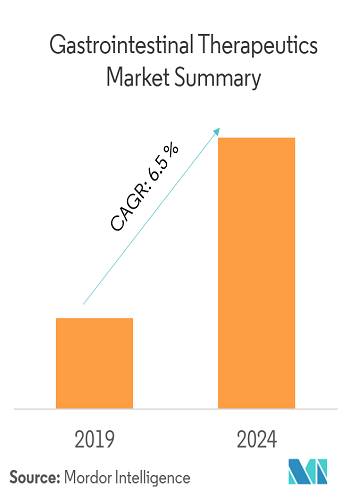
- The market is majorly driven by the lifestyle changes, leading to gastrointestinal (GI) diseases. According to the National Health Interview Survey (2017), 15.3 million adults were diagnosed with ulcers in the United States.
- Other driving factors include the rising surgical treatments and hospitalizations, due to GI diseases, and increasing R&D investments by biopharmaceutical companies in developing biologics and biosimilars.
- However, risk factors, such as those related to the physiological, behavioral, psychosocial, and socio-environmental aspects, restrict the populations from reporting the diseases early, which reflects the low awareness and the economic burden.
- These risk factors and the increasing number of patent expirations restrict the growth of the gastrointestinal therapeutics market.
Inflammatory Ulcerative Colitis Holds Significant Market Share
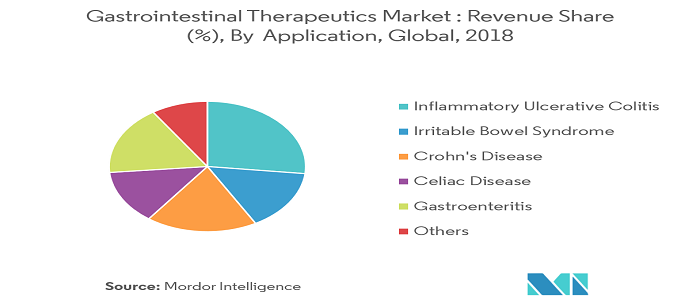
Inflammatory ulcerative colitis (UC) is often a relapsing and remitting disease. The disease often deals with lifelong treatment therapies. However, the current treatment options have several adverse effects and poor efficacy profiles. Additionally, sometimes, the drug is highly expensive, which makes this segment lucrative for the biopharmaceutical companies. Some of the traditional classes of drugs, including 5-aminosalicylic acid, corticosteroids, and immune-modulating drugs, are helpful for inflammatory bowel disease (IBD). Biologic drugs have also been explored in the past two decades, with several being marketed, which include anti-TNF drugs, immunosuppressive interleukins, and anti-interleukin antibodies. As per Merck & Co. Inc. (2018), although diverse medication facilities exist, one-third of the overall patient population suffering from UC ultimately requires surgery. Takeda Pharmaceuticals, Jassen Pharmaceuticals, and Pfizer are among the major global companies that have established themselves with their products for the treatment of inflammatory ulcerative colitis.
Top Gastroenterology companies:
- Allergan Pharmaceuticals
- Boston Scientific
- Cogentix Medical
- EndoChoice
- EndoGastric Solutions
- Evoke Pharma
- Exact Sciences Corp. (colorectal cancer)
- Fujifilm Medical Systems USA
- gMed, a Modernizing Medicine Co.
- Interscope
- Johnson & Johnson
- Motus GI
- Olympus Corp. of the Americas
- Pentax Medical USA
- Physicians Endoscopy
- Synergy Pharmaceuticals
- Salix Pharmaceuticals
- Shaili Endoscopy
- Takeda Pharmaceuticals USA
- US Endoscopy Group
Gastroenterology Associations and Societies in Europe:
- European Association for Gastroenterology, Endoscopy & Nutrition (EAGEN)
- United European Gastroenterology (UEG)
- European Society of Gastrointestinal Endoscopy (ESGE)
- European Society of Gastroenterology and Endoscopy Nurses and Associates (ESGENA)
- European Board of Gastroenterology and Hepatology (EBGH)
- The European Society for Paediatric Gastroenterology Hepatology and Nutrition (ESPGHAN)
- The European Society for Primary Care Gastroenterology (ESPCG)
- European Association for the Study of the Liver (EASL)
- European Society of Gastrointestinal and Abdominal Radiology
Associations and Societies of Gastroenterology worldwide:
- World Gastroenterology Organization
- Asian Pacific Association of Gastroenterology
- Chinese Society of Gastroenterology
- Gastroenterological Society of Singapore
- Malaysian Society of Gastroenterology & Hepatology
- Philippine Society of Gastroenterology
- The Hong Kong Society of Gastroenterology
- European Association for Gastroenterology, Endoscopy & Nutrition
- United European Gastroenterology
- European Society of Gastrointestinal Endoscopy
- European Society of Gastroenterology and Endoscopy Nurses and Associates
- The Japanese Society of Gastroenterology
- The Korean Society of Gastroenterology
- The Italian Society of Gastroenterology
- Italian society of Digestive Disease
- United European Gastroenterology
- Hepatology Society of the Philippines
- American Gastroenterological Association
- British Society of Gastroenterology
- American Society for Gastrointestinal Endoscopy
- European Society of Gastrointestinal and Abdominal Radiology
- Gastroenterological Society of Australia
- European Board of Gastroenterology and Hepatology
- United European Gastroenterology
- The European Society for Paediatric Gastroenterology Hepatology and Nutrition
- The European Society for Primary Care Gastroenterology
- European Association for the Study of the Liver
- Virginia Gastroenterological Society
- The Asian Pacific Association for the Study of the Liver
- The International Liver Cancer Association
Euro Gastro 2020, provides the participants with different modes or ways to participate under either ACADEMIC / STUDENT / BUSSINESS Category
-
SPEAKER (Oral Presentation) : 25-30 minutes (only one person can present)
-
SPEAKER (Workshop) : 45-50 minutes (more than 1 can present)
-
SPEAKER (Special Session) : 45-50 minutes (more than 1 can present)
-
SPEAKER (Symposium) : more than 45 minutes (more than 1 can present)
-
DELEGATE(only registration): Will have access to all the sessions with all the benefits of registration
-
POSTER PRESENTER: Can present a poster and avail the benefits of delegate
-
REMOTE ATTENDENCE: Can participate via VIDEO presentation or E-poster presentation
-
EXHIBITOR: Can exhibit his/her company’s products by booking exhibitor booths of different sizes
-
MEDIA PARTNER
-
SPONSOR
-
COLLABORATOR
For Researchers & Faculty:
-
Speaker Presentations
-
Poster Display
-
Symposium hosting
-
Workshop organizing
For Universities, Associations & Societies:
-
Association Partnering
-
Collaboration proposals
-
Group Participation
For Students & Research Scholars:
-
Poster Competition (Winner will get Best Poster Award)
-
Young Researcher Forum (YRF Award to the best presenter)
-
Student Attendee
-
Group Registrations
For Business Delegates:
-
Speaker Presentations
-
Symposium hosting
-
Book Launch event
-
Networking opportunities
-
Audience participation
For Companies:
-
Exhibitor and Vendor Booths
-
Sponsorships opportunities
-
Product launch
-
Workshop organizing
-
Scientific Partnering
-
Marketing and Networking with clients
For more details about each mode, kindly contact:
Ellie Smith (Program Director)
Conference Highlights
- Gastroenterology
- Gastrointestinal Bleeding and Pathology
- Colorectal and Intestinal Disorders
- Advances in Gastrointestinal Endoscopy
- Esophageal Diseases
- Gallstones and Bile Duct Stones
- Gastrointestinal Infection and Viral Gastroenteritis
- Gastroparesis
- Gut Microbiome
- Inflammatory Bowel Disease
- Therapeutic and Diagnostic Gastroenterology
- Gastrointestinal Radiology and Imaging
- Gastrointestinal Oncology
- Gastrointestinal Pharmacology
- Gastroenterological Transplantation
- Abdominal & Primary Care
- Advanced Hepatology
- Hepatitis and Liver Diseases
- Gastroenterology & Pregnancy
- Pancreatic Tumor and Cancer
- Hepato-pancreato-biliary disease
- Gastrointestinal and Minimally Invasive Surgery
- Obesity and Bariatric Surgery
- Neurogastroenterology and Motility
- Nutrition and Dietetics in Gastroenterology
To share your views and research, please click here to register for the Conference.
To Collaborate Scientific Professionals around the World
| Conference Date | October 21-22, 2020 | ||
| Sponsors & Exhibitors |
|
||
| Speaker Opportunity Closed | |||
| Poster Opportunity Closed | Click Here to View | ||
Useful Links
Special Issues
All accepted abstracts will be published in respective Our International Journals.
- Journal of Gastrointestinal & Digestive System
- Journal of Liver: Disease & Transplantation
- Journal of Hepatology and Gastrointestinal disorders
Abstracts will be provided with Digital Object Identifier by









